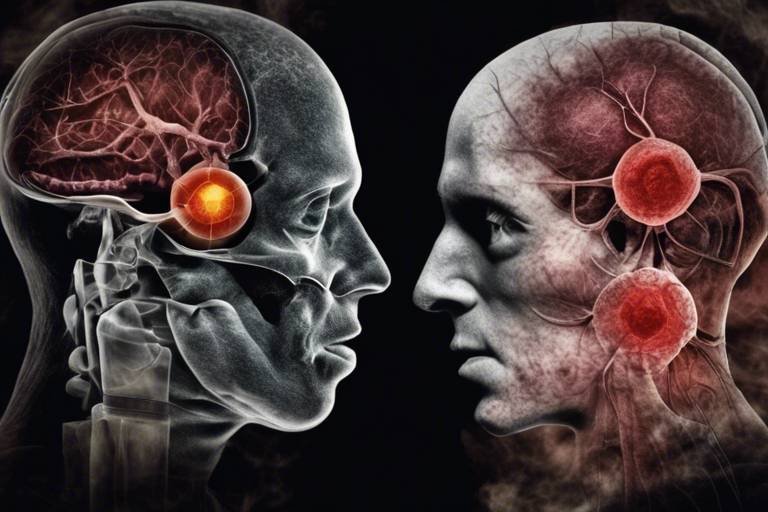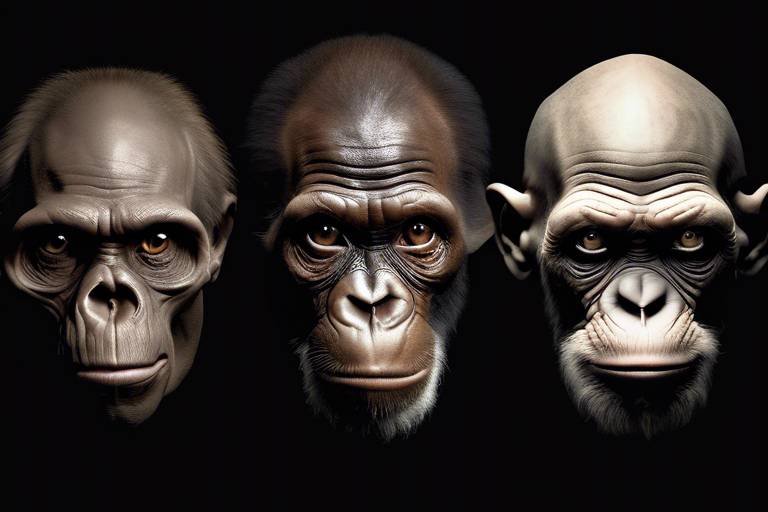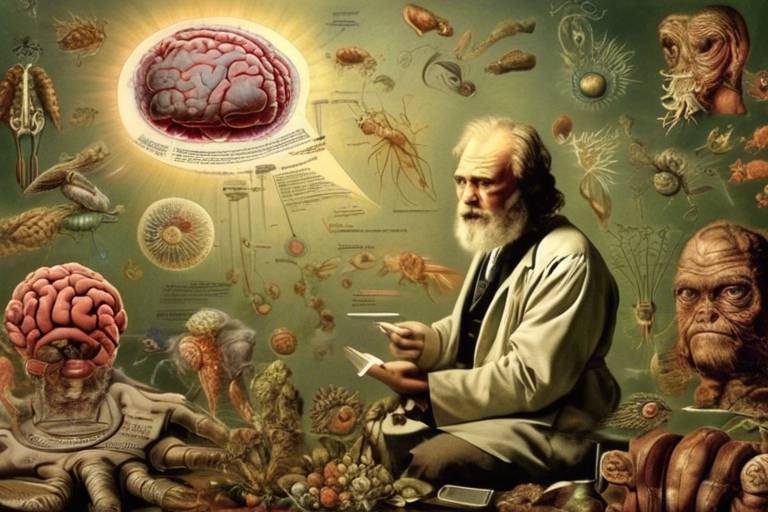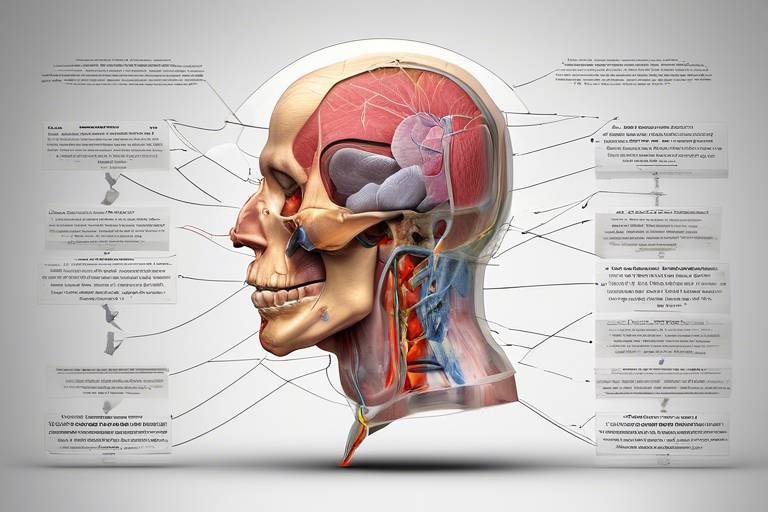Understanding Disease: The Philosophical and Scientific Scope
Disease is a multifaceted concept that has intrigued humanity for centuries, intertwining both philosophical and scientific dimensions. At its core, understanding disease goes beyond merely identifying symptoms or pathogens; it delves into the very essence of what it means to be healthy and how we approach the complexities of illness. As we navigate this intricate landscape, we encounter questions that challenge our perceptions: What constitutes a disease? How do our beliefs and values influence our understanding of health? These inquiries are not just academic; they shape the way we respond to health challenges in real life.
The interplay between philosophy and science in the realm of disease is akin to a dance, where each partner influences the other's movements. On one hand, scientific advancements provide us with tools to dissect and comprehend the biological mechanisms behind diseases. On the other hand, philosophical inquiry prompts us to reflect on the ethical implications of these discoveries. For instance, as we unlock the secrets of genetics and microbiology, we must also confront questions of morality: How do we balance the potential benefits of genetic engineering with the risks of playing 'God'? This dynamic relationship not only enriches our understanding but also ensures that we remain grounded in the human experience.
Moreover, the definitions and interpretations of disease can vary dramatically across different cultures and historical contexts. What one society may deem a disease, another might view as a rite of passage or a spiritual test. This cultural lens is crucial as it influences treatment modalities, healthcare policies, and societal attitudes towards those who are ill. The philosophical underpinnings of these perspectives can lead to a richer, more nuanced understanding of disease, reminding us that health is not merely the absence of illness but a state of overall well-being.
As we explore the historical evolution of disease concepts, we uncover a tapestry woven from the threads of human thought and scientific discovery. From ancient philosophies that attributed illness to moral failings to modern scientific approaches that emphasize empirical evidence, our understanding of disease has continuously evolved. This journey through time reveals not only the progress we've made but also the lingering questions that continue to challenge us today.
In conclusion, the quest to understand disease is an ongoing journey that requires us to engage with both scientific knowledge and philosophical inquiry. By embracing this duality, we can foster a more comprehensive understanding of health and illness, ultimately leading to better outcomes for individuals and society as a whole. As we advance into the future, the integration of these perspectives will be vital in addressing emerging health challenges and ensuring that our approaches to disease remain humane and ethical.
- What is the definition of disease? Disease is typically defined as a condition that disrupts normal bodily functions, often characterized by specific symptoms and signs.
- How do philosophical perspectives influence medical practices? Philosophical perspectives can shape ethical decision-making, guiding healthcare professionals in their approach to patient care and treatment options.
- Why is it important to consider cultural views on disease? Cultural views can significantly affect how diseases are perceived, treated, and understood, impacting healthcare outcomes and patient experiences.
- What role does science play in understanding disease? Science provides the tools and methodologies to study diseases, uncovering biological mechanisms and informing treatment strategies.

The Nature of Disease
When we think about disease, what comes to mind? Is it just a collection of symptoms, or is there something deeper at play? The nature of disease is a multifaceted concept that transcends mere biological definitions. At its core, disease can be understood as a disruption in the normal functioning of the body, but this simple definition barely scratches the surface. Various disciplines, including medicine, philosophy, and sociology, offer diverse interpretations of what constitutes a disease, and these interpretations significantly influence our approach to treatment and understanding.
To dive deeper, we must consider the different characteristics that define disease. For instance, diseases can be classified as acute or chronic, communicable or non-communicable, and even physical or mental. Each classification carries its own implications for diagnosis, treatment, and societal perceptions. Understanding these classifications helps us grasp the complexity of health challenges we face today. Moreover, the context in which a disease occurs—such as cultural, environmental, and social factors—plays a crucial role in shaping how we perceive and respond to it.
One of the most intriguing aspects of disease is the philosophical debate surrounding its definition. For example, some argue that disease should be viewed strictly from a biological standpoint, focusing on physiological abnormalities. In contrast, others advocate for a more holistic perspective that incorporates psychological and social dimensions. This brings us to an essential question: Should we consider a condition a disease solely based on its physical manifestations, or should we also account for the individual's experience and societal context?
Take mental health as an example. Conditions like depression and anxiety can severely impact a person's quality of life, yet they often lack the clear biological markers found in many physical diseases. This raises important discussions about the nature of disease itself. Is mental illness less valid as a disease because it doesn't always present with observable physical symptoms? This kind of questioning invites us to rethink our definitions and encourages a more inclusive understanding of health and illness.
Furthermore, the implications of how we define disease extend beyond individual treatment. They can influence public health policies, funding for research, and even the stigma surrounding certain conditions. For instance, conditions classified as "diseases" may receive more funding and resources than those viewed as "lifestyle choices." This discrepancy can lead to significant disparities in care and support for individuals suffering from various health issues.
In summary, the nature of disease is not just a biological phenomenon; it is a complex interplay of various factors, including societal perceptions, philosophical interpretations, and individual experiences. As we continue to explore this intricate landscape, it becomes clear that understanding disease requires a multidimensional approach that encompasses both scientific inquiry and philosophical reflection. Only by embracing this complexity can we hope to improve our responses to health challenges and foster a more compassionate approach to care.
- What is the definition of disease? Disease is typically defined as a disruption in the normal functioning of the body, which can manifest in various forms, including physical and mental health issues.
- How do cultural factors influence our understanding of disease? Cultural beliefs and practices can shape how diseases are perceived, treated, and stigmatized, affecting both individual experiences and public health responses.
- Why is the classification of diseases important? Classifying diseases helps in determining appropriate treatment options, understanding the nature of the condition, and addressing the specific needs of affected individuals.
- Can mental health conditions be considered diseases? Yes, mental health conditions are increasingly recognized as legitimate diseases, despite often lacking clear biological markers, highlighting the need for a broader understanding of health.

Historical Perspectives on Disease
Throughout history, the understanding of disease has undergone a remarkable transformation, shaped by various philosophical and scientific perspectives. In ancient times, diseases were often viewed as manifestations of supernatural forces or divine retribution. Early civilizations, such as the Egyptians and Greeks, attributed illness to the displeasure of gods, leading to various rituals and sacrifices aimed at appeasing these deities. This belief system laid the groundwork for how societies responded to health challenges, often prioritizing spiritual healing over physical remedies.
As we journey through time, we encounter the medieval period, where the understanding of disease took a significant turn. Illnesses were frequently interpreted through a religious lens, with many believing that diseases were a form of divine punishment for sins. This perspective not only shaped individual beliefs but also influenced public health responses. For instance, during outbreaks like the Black Death, societal reactions ranged from fervent prayers and processions to extreme measures like quarantine, reflecting a deep-seated fear of divine wrath. The intertwining of faith and health during this era illustrates how philosophical beliefs can dictate societal norms and medical practices.
In ancient Greece, philosophers like Hippocrates began to challenge the prevailing supernatural explanations for disease. Hippocrates, often referred to as the "Father of Medicine," proposed that diseases were caused by natural factors, such as environmental influences and lifestyle choices. This marked a pivotal shift towards a more empirical understanding of health and illness. His ideas laid the foundation for the Hippocratic Corpus, a collection of texts that emphasized observation and clinical practice, steering medicine towards a more scientific approach.
During the medieval period, the influence of the Church was paramount, and this shaped the understanding of disease significantly. Illness was often seen as a test of faith or a punishment for moral failings. This perspective led to various societal responses, including the establishment of hospitals as places of spiritual healing rather than just medical treatment. The concept of caring for the sick was intertwined with religious duty, highlighting how philosophical beliefs about morality and health can converge.
The Renaissance era heralded a dramatic shift in the understanding of disease, characterized by a resurgence of interest in empirical observation and scientific inquiry. Thinkers like Andreas Vesalius challenged long-held beliefs about human anatomy, leading to detailed studies that contradicted centuries of misinformation. This period laid the groundwork for modern medicine, as scholars began to prioritize observation and experimentation over doctrine. The Scientific Revolution further propelled this shift, with figures like Galileo and Newton advocating for a systematic approach to understanding the natural world, including the human body and its ailments.
Fast forward to the modern era, where advancements in genetics, microbiology, and epidemiology have revolutionized our understanding of diseases. Today, we recognize that diseases can be caused by a myriad of factors, including genetic predispositions, environmental influences, and infectious agents. This comprehensive approach allows for more effective prevention and treatment strategies, underscoring the importance of integrating scientific research with philosophical inquiry.
In summary, the historical perspectives on disease reveal a complex tapestry woven from philosophical beliefs and scientific discoveries. From the supernatural explanations of ancient times to the empirical observations of the Renaissance and the modern scientific approaches, our understanding of disease continues to evolve. This evolution not only reflects changes in medical practice but also highlights the ongoing dialogue between philosophy and science in shaping our responses to health challenges.
- What is the significance of historical perspectives on disease?
Historical perspectives help us understand how cultural, philosophical, and scientific beliefs shape our responses to health challenges. - How did ancient civilizations view disease?
Many ancient civilizations attributed diseases to supernatural forces or divine punishment, leading to rituals aimed at appeasing the gods. - What role did the Church play in medieval understandings of disease?
The Church influenced the perception of disease as a test of faith or punishment, affecting societal responses and the establishment of hospitals. - How did the Renaissance change the understanding of disease?
The Renaissance marked a shift towards empirical observation and scientific inquiry, laying the groundwork for modern medicine. - What modern approaches are used to study diseases?
Contemporary approaches include genetics, microbiology, and epidemiology, providing a comprehensive understanding of health and illness.

Ancient Philosophical Views
When we delve into the realm of ancient philosophical views on disease, we find ourselves navigating through a rich tapestry woven with threads of morality, spirituality, and early scientific thought. In a time when the mysteries of the human body and the nature of illness were still largely unexplained, ancient thinkers sought to understand disease through various lenses, often attributing it to factors far beyond mere biological or environmental causes.
For instance, many ancient cultures, including the Greeks and Egyptians, believed that disease was a manifestation of the gods' displeasure or a punishment for moral failings. This perspective is beautifully illustrated in the works of Hippocrates, often referred to as the "Father of Medicine." He shifted the focus from supernatural explanations to naturalistic ones, proposing that imbalances in bodily fluids, known as humors, were responsible for illness. However, even Hippocrates' views were steeped in the philosophical paradigms of his time, which still held a significant influence over how society perceived health and disease.
In ancient Greece, the dualism of body and soul was a prevalent theme. Philosophers like Plato argued that the state of one's soul could directly affect physical health. This idea prompted the thought that moral and ethical living was essential for maintaining health. Thus, a virtuous life was not just a philosophical ideal but a means to prevent disease. The connection between morality and health was so profound that it shaped societal norms and expectations, influencing everything from diet to lifestyle choices.
Similarly, in ancient Chinese philosophy, concepts of balance and harmony were central to understanding health. The practice of Traditional Chinese Medicine (TCM) emerged from these philosophical foundations, emphasizing the importance of maintaining equilibrium within the body and between oneself and the environment. Illness was perceived as a disruption of this balance, which could be restored through various means, such as acupuncture, herbal remedies, and dietary adjustments. This holistic approach highlights how ancient philosophies integrated physical, emotional, and spiritual health into their understanding of disease.
Furthermore, the ancient Indian texts, particularly the Ayurveda system, also reflected a philosophical understanding of disease. Ayurveda posited that health is a state of balance among three fundamental bodily doshas (Vata, Pitta, and Kapha). When these doshas are out of balance, disease arises. This perspective not only emphasizes the physical aspects of health but also incorporates mental and spiritual well-being, showcasing a comprehensive approach to understanding disease that resonates with many modern holistic practices.
In summary, ancient philosophical views on disease were profoundly intertwined with moral, ethical, and spiritual dimensions. They laid the groundwork for how societies interpreted illness and health, influencing treatment practices and societal attitudes toward those who were sick. As we reflect on these historical perspectives, it becomes evident that the understanding of disease is not merely a scientific endeavor but also a philosophical exploration that continues to shape our modern approaches to health.
- What were the main beliefs about disease in ancient Greece? Ancient Greeks believed diseases were caused by imbalances in the body's humors and often linked to moral and spiritual conditions.
- How did ancient Chinese philosophy view health? Ancient Chinese philosophy emphasized balance and harmony, suggesting that disease resulted from disruptions in these states.
- What is Ayurveda's approach to disease? Ayurveda focuses on the balance of bodily doshas and considers physical, mental, and spiritual well-being essential for health.

Medieval Understandings
During the medieval period, the understanding of disease was deeply intertwined with religious beliefs and spiritual interpretations. Illness was often viewed as a divine punishment or a test of faith, reflecting the prevailing worldview that intertwined the physical and the metaphysical. This perspective shaped not only how individuals understood their ailments but also how communities responded to health crises. People believed that suffering from disease could be a result of one's moral failings or sins, leading to a societal tendency to stigmatize the ill.
In this era, the concept of miasma emerged, suggesting that diseases were caused by "bad air" or noxious vapors. This idea, while not entirely accurate, illustrated a shift from purely spiritual explanations to more tangible environmental factors. However, the underlying belief remained that these environmental influences were often a reflection of divine will. For example, outbreaks of the plague were interpreted as God's wrath over humanity's sins, prompting communities to engage in penitential practices such as fasting and prayer in hopes of divine mercy.
Interestingly, medieval medicine was a blend of ancient Greek and Roman texts, along with local folk remedies. Physicians often relied on the teachings of Aristotle and Galen, whose works provided a framework for understanding the human body and its ailments. Yet, the application of these ideas was often overshadowed by religious doctrine. The Church played a significant role in medical practices, influencing not only the types of treatments that were acceptable but also the way patients were cared for. Monasteries became centers of healing, where monks and nuns tended to the sick, combining prayer with herbal remedies.
It is essential to recognize that the medieval understanding of disease was not entirely static; it evolved through various influences, including the Crusades, which brought new ideas and practices from the East. The interactions with Islamic scholars introduced advancements in medical knowledge, such as surgical techniques and the importance of observation in diagnosis. This gradual infusion of knowledge laid the groundwork for a more scientific approach that would emerge in the Renaissance.
In summary, the medieval era's approach to disease was characterized by a complex interplay of spiritual beliefs, environmental theories, and the gradual incorporation of empirical knowledge. While the spiritual lens dominated, the seeds of scientific inquiry were being sown, setting the stage for a transformative period in the understanding of health and illness.
- What was the primary belief about disease in the medieval period?
Most people believed that disease was a form of divine punishment or a test of faith, closely linked to moral or spiritual failings.
- How did religion influence medical practices during medieval times?
The Church played a significant role in shaping medical practices, often dictating acceptable treatments and encouraging prayer and penance as forms of healing.
- What role did ancient texts play in medieval medicine?
Medieval physicians relied heavily on ancient Greek and Roman texts, particularly the works of Aristotle and Galen, which provided foundational knowledge about the human body.
- How did the Crusades affect medical knowledge?
The Crusades facilitated the exchange of ideas and practices with Islamic scholars, leading to advancements in medical knowledge and techniques.

Renaissance and Scientific Revolution
The Renaissance, a period of rebirth and rediscovery in Europe from the 14th to the 17th century, marked a significant turning point in the understanding of disease. This era was characterized by a shift from the medieval reliance on religious explanations for illness to a more empirical and observational approach. Thinkers and scholars began to question long-held beliefs, leading to groundbreaking insights into the human body and its functions. Imagine a time when the world was awash in superstition, and suddenly, the light of reason began to shine through the cracks of ignorance, illuminating the path to modern medicine.
During this period, notable figures such as Andreas Vesalius emerged, challenging the teachings of Galen, which had dominated medical thought for centuries. Vesalius's meticulous dissections of human bodies revealed inaccuracies in previous anatomical models, paving the way for a more precise understanding of human physiology. Through his work, he demonstrated that observation and experimentation were crucial to understanding the complexities of the human body, effectively laying the groundwork for future scientific inquiry.
The Scientific Revolution, which followed the Renaissance, further propelled this shift in thinking. With the likes of Francis Bacon advocating for the scientific method, the focus turned towards systematic experimentation and evidence-based conclusions. This period saw the advent of new tools, such as the microscope, which opened up previously invisible worlds, allowing scientists to explore the minutiae of life. The discovery of microorganisms by pioneers like Anton van Leeuwenhoek fundamentally changed the perception of disease causation, shifting the narrative from mystical explanations to biological realities.
As the understanding of disease evolved, so did the approaches to treatment. Instead of relying solely on herbal remedies or spiritual healing, practitioners began to explore more direct interventions, such as surgery and anatomy-based therapies. This transition was not without its challenges; many traditional healers resisted these new ideas, fearing the loss of their authority and the disruption of established practices. However, the evidence was compelling, and as the scientific method gained traction, the medical community slowly embraced these revolutionary ideas.
In summary, the Renaissance and Scientific Revolution were pivotal in reshaping our understanding of disease. They ushered in an era where observation, evidence, and rational thought became the cornerstones of medical science. This profound transformation not only changed how diseases were understood but also laid the foundation for modern medical practices that continue to evolve today. The interplay between philosophical inquiry and scientific exploration during this time serves as a reminder of how far we've come and how crucial it is to remain curious and open-minded in our pursuit of health and knowledge.
- What was the main impact of the Renaissance on the understanding of disease?
The Renaissance shifted the understanding of disease from religious explanations to empirical observation, leading to advancements in anatomy and treatment methods.
- Who were some key figures in the Scientific Revolution regarding disease?
Notable figures include Andreas Vesalius, who challenged Galen's teachings, and Anton van Leeuwenhoek, who discovered microorganisms.
- How did the Scientific Revolution change medical practices?
The Scientific Revolution introduced the scientific method, emphasizing experimentation and evidence, which led to more effective treatment methods and a better understanding of disease causation.
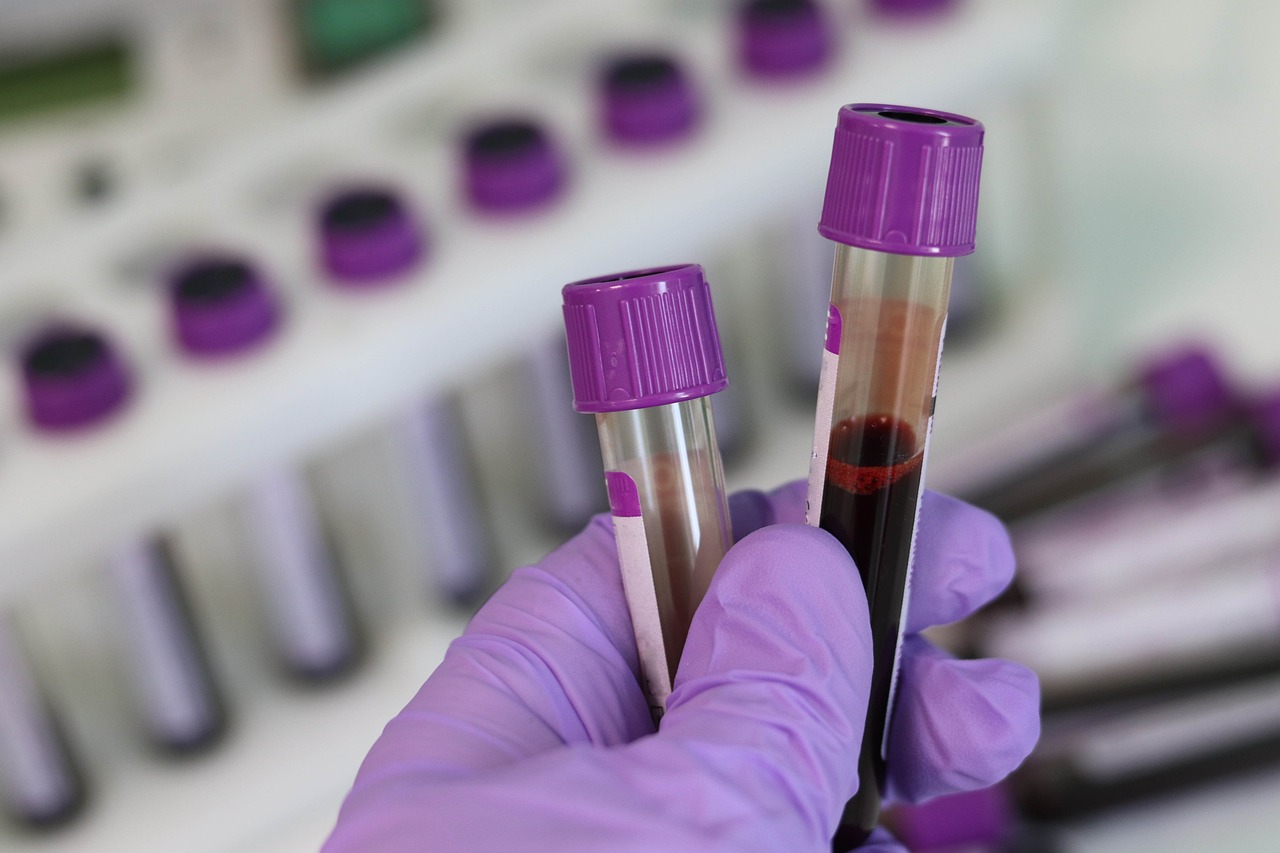
Modern Scientific Approaches
In today's fast-paced world, the study of disease has evolved into a sophisticated blend of various scientific disciplines. Modern scientific approaches have transformed our understanding of health and illness, allowing us to unravel the complexities of diseases at a molecular level. With advancements in genetics, microbiology, and epidemiology, researchers are now equipped to tackle health challenges that were once deemed insurmountable.
At the forefront of these scientific advancements is the field of genetics. The mapping of the human genome has opened up a treasure trove of information regarding hereditary diseases. By understanding the genetic makeup of individuals, scientists can identify predispositions to certain conditions, paving the way for personalized medicine. This tailored approach not only enhances treatment efficacy but also minimizes adverse effects, allowing healthcare providers to design interventions that cater to the unique genetic profiles of their patients.
Equally important is the role of microbiology in understanding infectious diseases. The advent of advanced imaging techniques and molecular diagnostics has revolutionized how we detect and treat pathogens. For instance, techniques such as polymerase chain reaction (PCR) enable rapid identification of bacterial and viral infections, facilitating timely and appropriate treatment. This capability is crucial, especially in the context of emerging infectious diseases, where every moment counts in preventing outbreaks.
Moreover, epidemiology serves as the backbone of public health initiatives. By analyzing patterns of disease distribution and determinants, epidemiologists provide invaluable insights into how diseases spread and affect populations. This information is essential for developing effective prevention strategies and interventions. For example, during the COVID-19 pandemic, epidemiologists played a critical role in tracking transmission rates and informing public health policies.
In addition to these disciplines, modern technology has introduced innovative tools such as artificial intelligence (AI) and machine learning. These technologies are being utilized to analyze vast amounts of health data, identifying trends and predicting disease outbreaks. By harnessing the power of AI, researchers can uncover hidden patterns that might otherwise go unnoticed, leading to more effective public health responses.
As we look to the future, the integration of these scientific approaches offers a promising horizon for disease understanding and management. The collaboration between different fields will not only enhance our comprehension of diseases but also improve treatment outcomes, ultimately leading to a healthier society. However, with these advancements come ethical considerations that must be addressed, ensuring that the benefits of science are accessible to all and that patient autonomy is respected.
- What is personalized medicine? Personalized medicine refers to tailoring medical treatment to the individual characteristics of each patient, often based on genetic information.
- How does microbiology contribute to disease understanding? Microbiology helps identify and study pathogens, enabling rapid diagnosis and treatment of infectious diseases.
- What role does epidemiology play in public health? Epidemiology analyzes disease patterns to inform public health policies and prevention strategies.
- How is AI used in modern medicine? AI is used to analyze health data, predict disease outbreaks, and enhance treatment plans by identifying trends.

The Role of Philosophy in Medicine
Philosophy plays a crucial role in shaping the landscape of medicine, influencing not only how we understand health and disease but also guiding the ethical frameworks within which medical professionals operate. At its core, philosophy encourages us to ask *fundamental questions* about the nature of health, the purpose of medical practice, and the ethical implications of our choices. For instance, what does it mean to be healthy? Is health merely the absence of disease, or does it encompass a broader understanding of well-being? These questions are not just academic; they have real-world implications for patient care and treatment strategies.
One of the most significant contributions of philosophy to medicine is its impact on *medical ethics*. Ethical principles derived from philosophical inquiry help healthcare professionals navigate complex dilemmas. For example, consider the principle of *autonomy*, which emphasizes the patient's right to make informed decisions about their own health. This principle stems from philosophical discussions about individual rights and personal freedom. In practice, this means that patients should be fully informed about their treatment options and involved in the decision-making process, empowering them to take charge of their health.
Moreover, philosophical discussions extend to the concept of *beneficence*, which is the obligation to act in the best interest of the patient. This principle can sometimes clash with patient autonomy, especially when a patient's choices may lead to harm. Healthcare professionals must carefully balance these competing values, a task that requires not only technical knowledge but also a deep understanding of ethical principles. This interplay between autonomy and beneficence often leads to intense debates and discussions in clinical settings, highlighting the importance of philosophical thought in everyday medical practice.
In addition to ethics, philosophy also influences our understanding of health itself. The *philosophy of health* examines what it means to be healthy and how societal values shape our perceptions of health and illness. Different cultures may have varying definitions of health, which can affect treatment approaches and patient interactions. For instance, in some cultures, mental health is viewed as equally important as physical health, while in others, it may be stigmatized. Understanding these cultural nuances is essential for providing effective and compassionate care.
To illustrate the philosophical dimensions of medicine, consider the following table that outlines key philosophical principles and their implications in medical practice:
| Philosophical Principle | Description | Implications in Medicine |
|---|---|---|
| Autonomy | The right of patients to make informed decisions about their own health. | Informed consent, shared decision-making. |
| Beneficence | The obligation to act in the best interest of the patient. | Prioritizing patient welfare in treatment options. |
| Non-maleficence | The duty to do no harm. | Careful consideration of risks versus benefits in treatment. |
| Justice | The principle of fairness in medical treatment and resource allocation. | Equitable access to healthcare services. |
As we look to the future, the integration of philosophy into medicine will continue to be essential, especially as we navigate the complexities of emerging technologies and personalized medicine. The ethical implications of advancements such as genetic editing and artificial intelligence in healthcare raise profound philosophical questions that demand thoughtful consideration. How do we ensure that these technologies are used ethically? What safeguards should be in place to protect patient rights?
Ultimately, the role of philosophy in medicine is to foster a deeper understanding of the human experience of health and illness. It prompts us to reflect on our values, the nature of our interactions with patients, and the societal structures that influence healthcare delivery. By embracing this philosophical perspective, we can strive for a more compassionate, ethical, and holistic approach to medicine.
- What is the importance of philosophy in medicine?
Philosophy helps shape ethical frameworks, influences patient care decisions, and enhances our understanding of health and illness. - How does philosophy affect medical ethics?
Philosophical principles guide healthcare professionals in navigating complex ethical dilemmas, balancing patient autonomy with beneficence. - Can philosophy improve patient outcomes?
By promoting a deeper understanding of patients' needs and values, philosophy can lead to more personalized and effective care.

Ethical Considerations
When we dive into the realm of medical ethics, we find ourselves navigating a complex web of moral questions and dilemmas that healthcare professionals face daily. These ethical considerations are not just abstract ideas; they have real-world implications that can significantly affect patient care and treatment outcomes. For instance, how do we balance the need for innovative treatments with the potential risks involved? Or, how do we ensure that patient autonomy is respected while also providing the best possible care? These questions are at the heart of medical ethics and highlight the importance of a philosophical framework in guiding healthcare decisions.
One of the most pressing ethical dilemmas is the concept of informed consent. Patients have the right to know what treatments they are receiving, the risks involved, and the potential outcomes. However, the challenge lies in ensuring that patients truly understand this information. Medical jargon can often cloud communication, leading to misunderstandings. Thus, healthcare providers must not only present information but also ensure that patients comprehend it fully. This brings us to the ethical principle of autonomy, which asserts that individuals should have the freedom to make their own choices regarding their health.
Another critical aspect is the principle of beneficence, which emphasizes the obligation of healthcare professionals to act in the best interest of their patients. This principle can sometimes conflict with the idea of autonomy. For example, consider a scenario where a patient refuses a life-saving treatment due to personal beliefs. Should the physician respect the patient's wishes, or should they intervene, believing that they know what is best? This tension between autonomy and beneficence is a classic ethical dilemma that requires careful consideration and often a tailored approach to each individual case.
Furthermore, the principle of justice comes into play, which demands fairness in the distribution of healthcare resources. In an era where healthcare costs are skyrocketing, and resources are limited, ensuring that all patients receive equitable care is a formidable challenge. This principle raises questions about how we allocate resources, prioritize treatments, and address disparities in healthcare access. For instance, should priority be given to those who can afford treatment, or should we focus on providing equal care to all, regardless of financial status?
To illustrate these ethical considerations further, let’s take a look at a simplified table that summarizes the key principles of medical ethics:
| Ethical Principle | Description |
|---|---|
| Autonomy | The right of patients to make informed decisions about their own healthcare. |
| Beneficence | The obligation to act in the best interest of the patient. |
| Non-maleficence | The duty to do no harm to patients. |
| Justice | The principle of fairness in the distribution of healthcare resources. |
As we ponder these ethical considerations, it becomes evident that the intersection of philosophy and medicine is not just an academic exercise. It has profound implications for how we approach healthcare in our society. As technologies advance and new treatment modalities emerge, the ethical landscape will continue to evolve, demanding ongoing dialogue and reflection among healthcare providers, patients, and policymakers alike. The future of medicine will undoubtedly challenge us to think critically about these ethical principles and how they can guide us in making decisions that honor both the science of medicine and the humanity of those we serve.
- What is informed consent? Informed consent is the process by which a patient is educated about the risks and benefits of a treatment, allowing them to make an informed decision about their healthcare.
- How do autonomy and beneficence conflict in medical practice? Autonomy allows patients to make their own healthcare decisions, while beneficence requires healthcare providers to act in the patient's best interest, which can sometimes lead to conflicts.
- What is the principle of justice in healthcare? The principle of justice emphasizes fairness in the distribution of healthcare resources, ensuring that all patients have equitable access to care.

Philosophy of Health
The delves deep into what it means to be healthy and how we define health itself. It's not just a matter of the absence of disease; rather, health encompasses a broader spectrum of physical, mental, and social well-being. Have you ever considered how your emotional state can affect your physical health? Or how societal factors can play a role in your overall wellness? These questions highlight the intricate connections within the philosophy of health, urging us to rethink traditional definitions.
At its core, the philosophy of health challenges us to explore several key concepts:
- Well-being: This concept goes beyond mere physical health. It includes emotional stability, mental clarity, and social connections. A person can be free from illness yet still feel unwell due to stress or loneliness.
- Holistic Approaches: The idea that health should be viewed as a whole system rather than isolated parts. This perspective encourages a balance between mind, body, and spirit.
- Social Determinants: Factors such as socioeconomic status, education, and community influence health outcomes. Understanding these elements is crucial for developing effective health policies.
Philosophers have long debated the nature of health. Some argue that health is a state of equilibrium, while others see it as a dynamic process influenced by countless variables. This ongoing dialogue shapes how we approach healthcare and wellness practices today. For instance, the rise of integrative medicine reflects a growing recognition that health is not merely the absence of disease but a comprehensive state of well-being.
Moreover, the philosophy of health raises essential questions about the role of healthcare systems. Are they designed to promote health, or do they primarily focus on treating illness? This inquiry is particularly relevant in an era where healthcare costs are skyrocketing, and access to services is uneven. As we navigate these complexities, it becomes evident that a philosophical approach is vital in crafting policies that prioritize health promotion over mere disease management.
In conclusion, the philosophy of health invites us to broaden our understanding of what it means to be healthy. It encourages a more nuanced view that encompasses physical, mental, and social dimensions. By embracing this holistic perspective, we can foster a more inclusive and effective approach to health and wellness in our communities.
- What is the main focus of the philosophy of health?
The philosophy of health primarily focuses on understanding health as a state of well-being that includes physical, mental, and social aspects. - How does the philosophy of health influence healthcare practices?
It encourages a more holistic approach to health, emphasizing prevention and wellness rather than just treatment of diseases. - Why are social determinants important in health philosophy?
Social determinants significantly impact health outcomes and understanding them is crucial for developing effective health interventions.

Future Directions in Disease Understanding
The landscape of disease understanding is rapidly evolving, driven by advancements in technology and a deeper philosophical inquiry into health. As we look to the future, several key trends are emerging that promise to reshape how we perceive and treat diseases. One of the most exciting developments is the rise of personalized medicine. This approach tailors treatment to the individual characteristics of each patient, considering factors like genetics, environment, and lifestyle. Imagine a world where your doctor prescribes a treatment plan specifically designed for your unique genetic makeup—this is not science fiction, but a burgeoning reality.
Alongside personalized medicine, we are witnessing an increased integration of artificial intelligence (AI) in healthcare. AI algorithms are being developed to analyze vast amounts of medical data, identifying patterns that may elude even the most experienced physicians. For instance, AI can assist in early disease detection by analyzing medical images or predicting outbreaks by examining epidemiological data. This intersection of technology and medicine not only enhances diagnostic accuracy but also opens the door to more proactive health management.
Moreover, the ethical implications of these advancements cannot be overlooked. As we harness the power of technology, questions arise about patient privacy, consent, and the potential for inequality in access to these cutting-edge treatments. Philosophical discussions will be crucial in navigating these ethical dilemmas, ensuring that advancements in healthcare do not leave vulnerable populations behind.
Another promising area is the exploration of the microbiome—the collection of trillions of microorganisms living in and on our bodies. Recent research suggests that our microbiome plays a significant role in our overall health, influencing everything from digestion to immune function. Understanding this complex ecosystem could lead to innovative treatments for diseases that currently have limited options. For example, manipulating gut bacteria might provide new avenues for treating autoimmune diseases or mental health disorders.
To summarize, the future of disease understanding is a tapestry woven from threads of personalized medicine, AI integration, ethical considerations, and microbiome research. As these elements converge, they will redefine our approach to health and well-being. The journey ahead is not just about curing diseases; it's about enhancing our quality of life and redefining what it means to be healthy.
- What is personalized medicine?
Personalized medicine is a medical model that tailors treatment to the individual characteristics of each patient, including their genetic profile and lifestyle. - How does AI impact healthcare?
AI enhances healthcare by analyzing large datasets to identify patterns, improving diagnostic accuracy, and predicting health trends. - What ethical concerns arise with new medical technologies?
Ethical concerns include patient privacy, consent, and equitable access to advanced treatments. - What role does the microbiome play in health?
The microbiome influences various aspects of health, including digestion and immunity, and is a promising area for future disease research.
Frequently Asked Questions
- What is the definition of disease?
Disease is generally understood as a deviation from the normal physiological functioning of the body. It can manifest in various forms, impacting physical, mental, or social well-being. Different disciplines may interpret disease differently, leading to various treatment approaches.
- How have historical perspectives shaped our understanding of disease?
Historical perspectives have played a crucial role in shaping modern views on disease. For example, ancient civilizations often linked illness to moral failings, while the Renaissance emphasized empirical observation, paving the way for scientific inquiry and modern medicine.
- What role does philosophy play in medicine?
Philosophy significantly influences medical ethics and decision-making. It helps healthcare professionals navigate ethical dilemmas, ensuring that patient autonomy and moral implications are considered in treatment choices.
- What are some ethical considerations in medical practice?
Ethical considerations in medical practice include patient consent, the right to refuse treatment, and the implications of advanced medical technologies. These dilemmas often require a philosophical framework to guide informed decision-making.
- How is the concept of health viewed philosophically?
Philosophically, health is often seen as a state of well-being that goes beyond mere absence of disease. It encompasses physical, mental, and social dimensions, influencing how we approach disease prevention and management.
- What are the future directions in understanding diseases?
The future of disease understanding may involve personalized medicine, where treatments are tailored to individual genetic profiles. Additionally, the ethical implications of advanced technologies in healthcare will continue to be a significant area of exploration.

